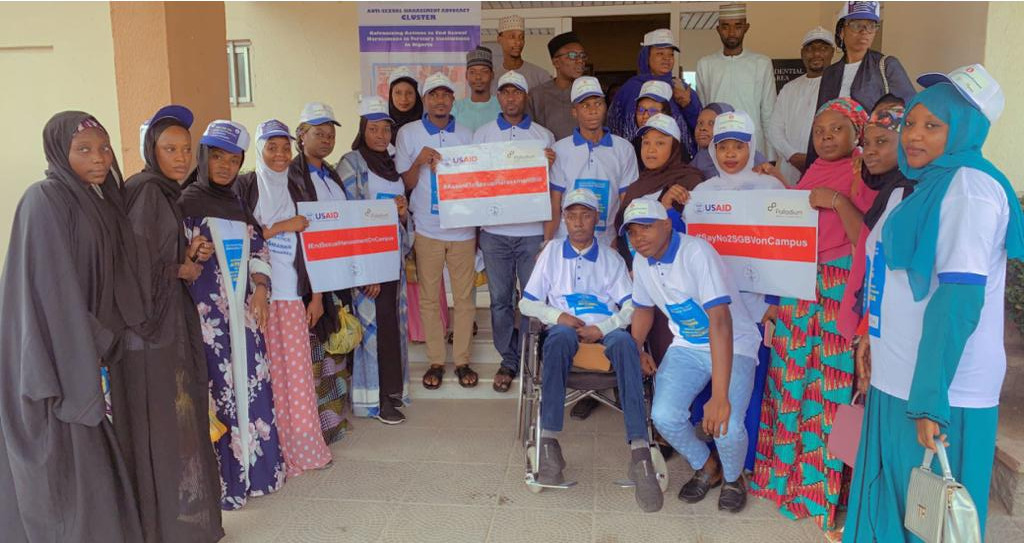
Vivil society organisations, under the aegis of the Anti-sexual Harassment Advocacy Cluster, have appealed to President Muhammadu Buhari to consider immediate assent to the Anti-Sexual Harassment bill into law.
Besides, the consortium working to address the prevalence of sexual harassment in tertiary institutions in Nigeria has unveiled an Anti-Sexual Harassment campaign to end all forms of harassment against the female gender in places of higher learning.
A statement by Executive Director Centre for Awareness on Justice and Accountability (CAJA), Kabiru Dakata, on behalf of the consortium, said the appeal become pertinent due to the alarming rates of sexual assault against female undergraduates in Nigeria.
Dakata said the National Assembly has recently passed the Anti-Sexual Harassment Bill into law, the bill seeks to promote and protect ethical standards in tertiary institutions.
According to him, the bill that was sponsored by Sen. Ovie Omo-Agege and 57 other senators in 2016, eventually scaled through in October 2019 after a series of setbacks.
He said thought the passage was facilitated by the famous BBC documentary which exposed two lecturers of the University of Lagos, and a lecturer of the University of Ghana, who was caught in the act.
Dakata said, “70 per cent of female graduates from Nigerian tertiary institutions had been sexually harassed in school, mostly by classmates and instructors, a 2018 World Bank Group survey indicated.
“In the survey conducted in 19 tertiary institutions across six states in Nigeria by the consortium of civil society organisations, including CAJA, Social Action, We the People, and led by Youth Alive Foundation (YAF), lack of clear reporting channels was one of the discouraging factors to report sexual harassment.
“56 per cent of respondents said there were no clear channels to report sexual harassment in their institutions, and they were unaware of any law protecting them against sexual harassment on campus. Also damning, is the lack of a unified law to combat the scourge in all Nigerian higher institutions.”
He added, “Sexual harassment includes unwanted, inappropriate, and offensive sexual advances like repeated and unwanted sexual invitations; insistent requests for dates/dinner/drinks; phone calls, messages, etc., solicitation of sexual activity or other sex-linked behavior by promise of reward (overt or subtle), sexual comments, touching the someone’s body, hair or clothes, standing close or brushing up against another person, kissing sounds, howling and smacking.”
Dakata explained that the launch of the Anti-Sexual Harassment campaign will help address some of the issues outlined and the longer-term objectives of lending its voice toward the timely Presidential Assent to the Anti-Sexual Harassment Bill.
He delcared that the bill when signed into law, will also enable the Establishment of the Independent Sexual Harassment Prohibition Committee in tertiary institutions and the Formation of the ‘Campaign Against Sexual Harassment (CASH)’ Club.
Members of the cluster include Centre for Awareness on Justice and Accountability (CAJA) Kano State, Youth Alive Foundation (YAF) Abuja, Village Debbo Care Initiative (VDCare) Kaduna State, Sefjamil Media and Development (SMD) Kano State, Joint Association of Persons with Disability (JONAPWD), Gombe State Chapter, Women`s Rights and Health Project (WRAHP) Lagos State and Connected Development – Akwa Ibom State (CODE).
This Project is supported by the strengthening civic advocacy and local engagement (SCALE) project through the United States agency for international development (USAID). The contents of this message are the sole responsibility of the Anti-Sexual Harassment Advocacy Cluster and do not reflect the views of the United States government.



